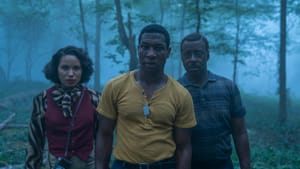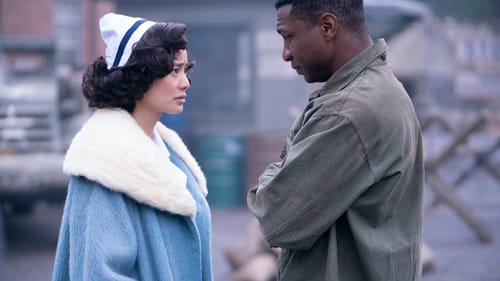Stay in the Loop
BSR publishes on a weekly schedule, with an email newsletter every Wednesday and Thursday morning. There’s no paywall, and subscribing is always free.
Escapism is not for us
I didn’t find reverie in ‘Lovecraft Country,’ but that’s not what I’m looking for

You want to know a plot twist? Until my late twenties, I read very few books in my leisure time. Literature and book culture were tinged with uninviting elitism. The classics that curricula force-fed to me throughout high school and college were written by racist white authors. I had wanted to be a writer since I was a preschooler, but it wasn’t because of the books I’d read. Instead, I’ve been writing in spite of books, literature, and even journalism, but I didn’t understand why until Lovecraft Country.
Painfully revitalizing
HBO’s new show is helmed by showrunner Misha Green with Jordan Peele, J.J. Abrams, and Ben Stephenson as producers. Based on the 2016 novel of the same name by Matt Ruff, it follows Atticus Freeman (Jonathan Majors) and Letitia Lewis (Jurnee Smollet) as they embark on an adventure of sorts to find Atticus’s father and recover the mysterious Book of Names. A 1950s period piece, the show is threaded with references to Black history and science fiction and fantasy novels. Perhaps more importantly, it takes the racism of many science-fiction authors before and during the Jim Crow era and turns their legendariums upside down, especially the notoriously bigoted H.P. Lovecraft.
Lovecraft Country is a painfully revitalizing series that couldn’t come at a better time. Despite its problems, the show’s entry into Black sci-fi canon marks progress on a path that winds impossibly long. Like, forever long. There’s so much to do when it comes to filling out the scarcity of Black narratives in film and television. And it arrives with a sense of hope as it observes a seemingly unchanged milieu of social injustice, discrimination, and genocide.
The show is enchanting. From brooding undertones captured in its lingering cinematography to gripping performances from Majors, Smollet (who I’d argue is the story’s real hero), and others like Michael K. Williams, Wunmi Mosaku, and Courtney B. Vance, Lovecraft Country packs a powerful punch with its unnerving sci-fi horror elements, its not-always-so-nuanced references and metaphors, unapologetic genre-bending, and coiling plot twists. The blend isn’t seamless but it makes sense. Because why not have Jackie Robinson destroy Cthulhu with a baseball bat and deliver a line in the first episode that would bear significance in the plot later?
What I yearned for
It’s the kind of story I yearned for in books. Certainly, they existed. For starters, Octavia Butler’s works inspired me to pursue writing seriously in high school. N.K. Jemisin’s The Fifth Season shifted me and my perception of myself as a speculative fiction writer. But before the internet, finding and accessing these sorts of stories was hard—especially when instructors, professors, and colleagues who recommended and assigned books were, well, very white. And these weren’t the stories that were prevalent, popular, or as accessible as what populated the shelves, channels, and cinemas.

Let’s take stock here. Gone with the Wind by Margaret Mitchell whitewashed the experience of slavery, portraying enslaved people as loyal servants who were happy with their lives and their work. Edgar Rice Burroughs’s Tarzan series is a purveyor of eugenics and scientific racism—and he wasn’t trying to hide it, either. Roald Dahl’s books are vastly immoral for various reasons too long to list here. Jane Eyre has racist, ableist, and antifeminist problems. Toni Morrison said the few Black characters in Ernest Hemingway’s fiction served to “articulate the narrator’s doom and gainsay the protagonist-narrator’s construction of himself … We are left, as readers, wondering what to make of such prophecies, these slips of the pen, these clear and covert disturbances.” She offers unabashed criticism of a handful of other revered authors in her book Playing in the Dark, urging a reappraisal of Western literary traditions.
These “slips of the pen” (especially those of Lovecraft himself) are what make reading while Black dangerous. “Scholars” might argue otherwise, but come on—we know what they were doing. Escapism doesn’t always work for nor is it always designed for Black people, and it wasn’t until this summer that I not only accepted this truth, but found alternatives.
Changing the filter
Lovecraft Country is not an easy show to watch. Some of its scenes, particularly ones featuring racist cops, are triggering. Allyship from its white “protagonists” is always questionable. Complex questions of identity around race and sexuality are raised and then are answered with troubling resolutions (which is where the show’s flaws unravel metaphysically). And it’s scary as hell. I didn’t find reverie with Lovecraft Country, nor was I looking for it. What I was looking for was how to culminate and express a wide spectrum of emotions—joy, pain, disenchantment, victory, and a small peppering of tempered revenge—in a fulfilling and compassionate way.
Black suffering has become entertainment. Lovecraft Country diffuses that by coloring the lenses.

Much of the Black literature I was exposed to in my upbringing focused on suffering: slavery, segregation, death, and oppression. These stories are all filtered through a series of white lenses: if it’s not the person writing or directing it, or if there’s not a white character centered as the protagonist, producers, editors, and publishers left indelible, seemingly insignificant marks on the fiction that sought to encapsulate the Black experience. That encapsulation is typically for sensationalist reasons that are easy to market and make commercial. There has been a shift away from that in the last few years. Luke Cage broke the Internet in 2016. Black Panther smashed box-office records in 2018. Lovecraft Country may not achieve the same popularity, but it moves the needle and adds more colors to the lens filters.
Room for more
How often do we get to indulge in “escapism” as Black folk? Professionally, it isn’t often. Misha Green started as a staff writer for Heroes and Sons of Anarchy—two relatively lighthearted series—before moving on to create Underground. The 2016 TV series was a period piece about the Underground Railroad in the Antebellum South. Teaming up with Jordan Peele for Lovecraft Country was a perfect convergence: with Peele’s comedic sensibilities in films like the socially terrifying Get Out and Us, and Green’s fluency in superhero fiction and period pieces (especially Black period pieces), the genre-mashing creation of Lovecraft Country is as political as it is frightening. Much like the Black experience itself.
There’s still so much room to fill with stories like this. Lovecraft Country reclaims a wide swath of racist, bigoted literature and repurposes it, offering both insight and new notions. It doesn’t erase that part of history; it acknowledges it, owns it, and redefines it. Lovecraft Country is an escape from escapism, a glimmer of hope, a necessary addition for readers and writers who have long been conflicted by their relationship with storytelling. It’s part of a long equation building the multi-faceted antidote to 400 years of conditioning, exacerbated by contemporary misrepresentation. No, the show isn’t a catch-all, but it certainly advances the chrysalis of unlearning and self-discovery for the sake of Black thrival in storytelling.
Image description: A still from Lovecraft Country shows three actors, Jurnee Smollet, Jonathan Majors, and Courtney B. Vance, facing the camera, centered, with an ominous, blue-hued wooded area behind them. They have wary expressions.
Image description: A still from Lovecraft Country shows the actor Jurnee Smollet standing at the center, looking to the left with her hands behind her, wearing a cap-sleeved navy-blue dress with a graveyard and autumn leaves in the blurry background.
Image description: A still from Lovecraft Country shows actors Jamie Chung and Jonathan Majors. They are facing each other, about a foot apart, with worried expressions in profile. Chung is wearing a blue-and-white coat and a 1950s-style nurse’s hat, and Majors wears a khaki jacket.
What, When, Where
The debut season of Lovecraft Country is available for streaming in its entirety now on HBO Max. Closed captions are available.
Sign up for our newsletter
All of the week's new articles, all in one place. Sign up for the free weekly BSR newsletters, and don't miss a conversation.

 Kyle V. Hiller
Kyle V. Hiller